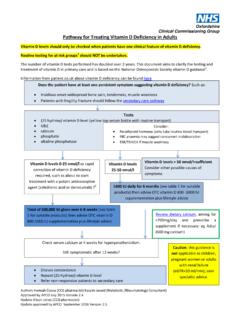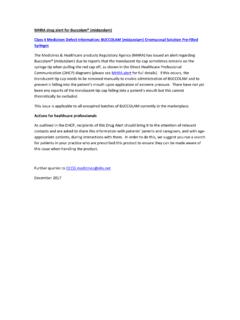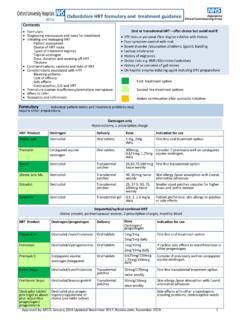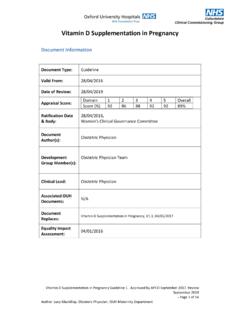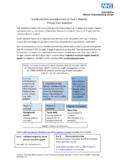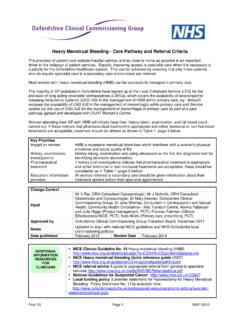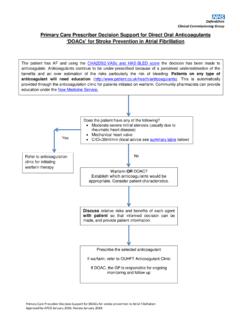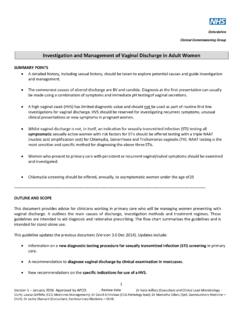Transcription of Proton Pump Inhibitors Patient Information Leaflet
1 Approved by: APCO July 2016 Oxfordshire Clinical Commissioning Group Proton Pump Inhibitors (PPIs) Omeprazole or Lansoprazole for the Treatment of Heartburn and Indigestion an Information Leaflet for patients Introduction Your stomach produces acid to help digest food but in some people the acid can irritate the stomach causing pain and discomfort. It can also leak back up into the gullet (oesophagus), causing symptoms of heartburn and indigestion. Heartburn is a burning pain felt in the chest behind the breastbone. Indigestion, or dyspepsia, is pain or discomfort in the stomach or upper abdomen. If you have persistent vomiting, unexplained weight loss, blood in your stool or vomiting blood, see your doctor immediately as these may be signs of a more serious problem.
2 What are Proton Pump Inhibitors and how do they work Proton pump Inhibitors , or PPIs, are a group of medicine that work by reducing the amount of acid that your stomach makes. This in turn reduces the pain or discomfort in your chest or stomach, and allows your body to heal any inflammation. The recommended PPIs in Oxfordshire are omeprazole and lansoprazole. Other PPIs are called esomeprazole, pantoprazole and rabeprazole. What are the side effects of PPIs? The possible side effects are usually mild and reversible, and may include constipation, diarrhoea, wind, feeling sick, vomiting and headaches. Long-term use of PPIs may cause other side effects: Approved by: APCO July 2016 Increased risk of certain gastrointestinal infections Clostridium difficile Observational studies show increased risk of developing osteoporosis (a condition that affects bones) and bone fractures.
3 What I can do to help with symptoms? It is common for people to get heartburn and indigestion from time to time. You may find the following measurements can help reduce symptoms occurrence: eat smaller and more frequent meals, and avoid eating three to four hours before lying down or going to bed keep to a healthy weight stop smoking avoid fizzy drinks avoid foods that give symptoms coffee, chocolate, alcohol, tomatoes, and fatty or spicy food avoid anti-inflammatory painkillers ibuprofen reduce stress by learning relaxation techniques avoid tight belts or clothing raise the head of your bed by about 4-8 inches using blocks under the legs of the bed Over-the-counter medicines called alginates or antacids can be helpful in relieving heartburn and indigestion.
4 Always check with your pharmacist or doctor to make sure it is suitable for you. Starting treatment on a PPI Most people are able to treat heartburn and indigestion with simple changes to their diet and lifestyle, or with medicines such as alginates and/or antacids. If your symptoms do not get better despite these measurements, your doctor may prescribe you a PPI for four weeks. If your symptoms continue, then a further four weeks supply may be prescribed. Most people only need a short course of treatment, although some may find their symptoms return several months later. Your doctor will advise you how long you should be taking your PPI for.
5 What happens if I stop my PPI? If you take a PPI for more than a few weeks, your stomach may temporarily increase its ability to make acid, so that when the PPI is stopped, acid levels may be higher than before it was started. For this reason some people find that their symptoms worsen when they try to stop taking a PPI. These are known as rebound symptoms and they can last for up to two weeks. Rebound symptoms can be reduced by stopping PPIs slowly and making simple lifestyle changes. Approved by: APCO July 2016 Stepping down or stepping off PPIs After the initial course of four to eight weeks, your doctor may advise you to step down or step off your PPI treatment to reduce the potential for side effects.
6 However, some conditions ( Barrett s Oesophagus) require long term PPI treatment, therefore please do not change doses or stop treatment unless you have discussed this with your GP. If you are suitable for stepping down or stepping off PPI treatment, your doctor will discuss with you which approach would suit you best: 1. Take when needed treatment You only take a PPI occasionally when you have symptoms. 2. Short courses of treatment If your symptoms return, a short course of PPI may be prescribed for two to four weeks. 3. Reducing dose The dose is reduced to the lowest effective dose. This can be done gradually over a few weeks.
7 4. Stopping altogether (step off) If you are on a high dose, your doctor can prescribe a lower dose for you to take over four weeks, until you reach the lowest dose, and eventually you may be able to stop altogether. For example: Lansoprazole 30mg 15mg stop Omeprazole 40mg 20mg 10mg stop 5. Alternative treatment An alginate and/or antacid may be recommended or prescribed, especially if you have rebound symptoms in the first few weeks of stepping down or off. You should always leave at least an hour between taking an antacid and a PPI because antacids can make PPIs less effective. It is important that you continue to follow our advice on lifestyle and diet to keep your symptoms at bay.
8 Produced by the Medicines Optimisation Team, Oxfordshire Clinical Commissioning Group. Adapted from the NHS Forth Valley Patient Information Leaflet . 28/06/2016

